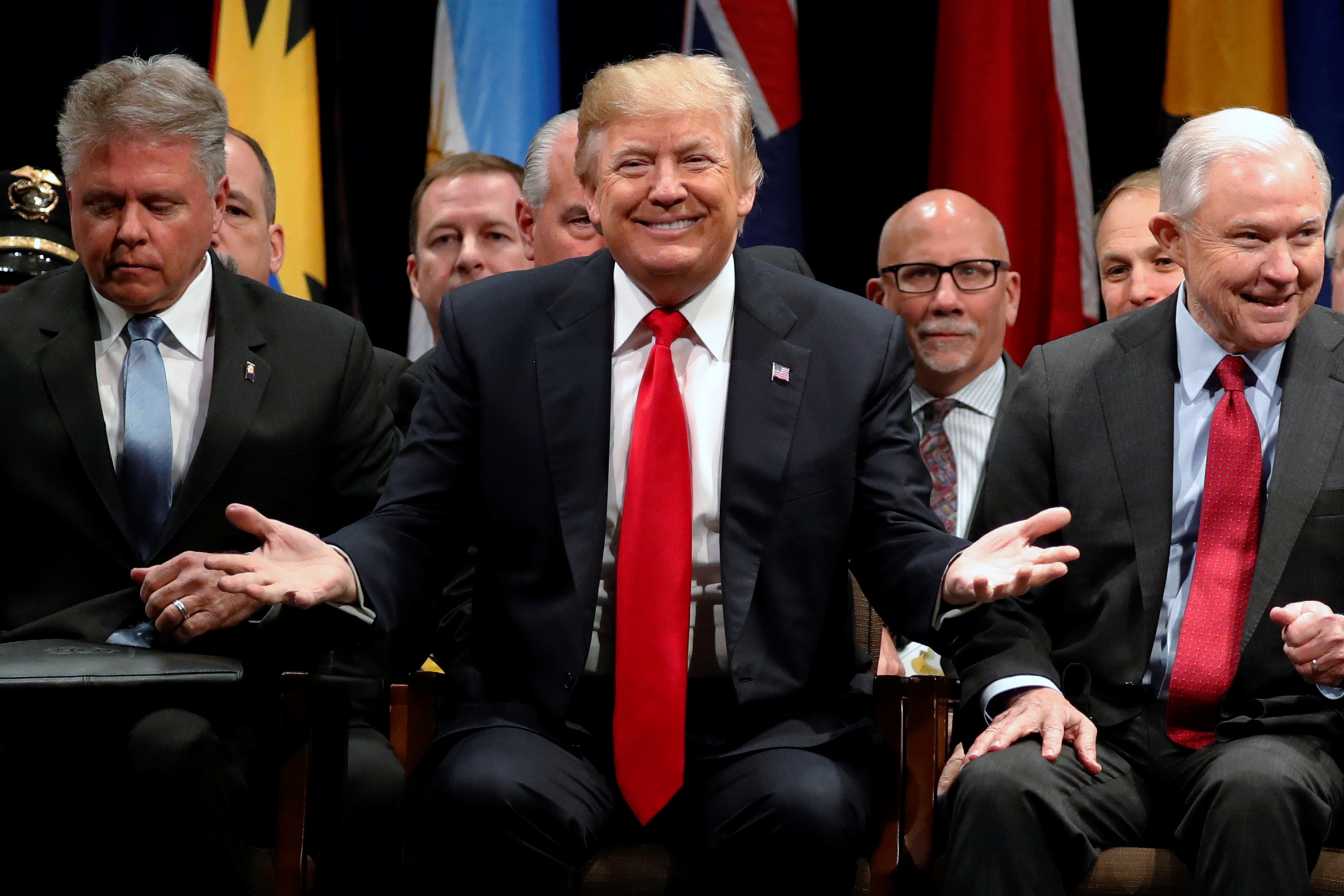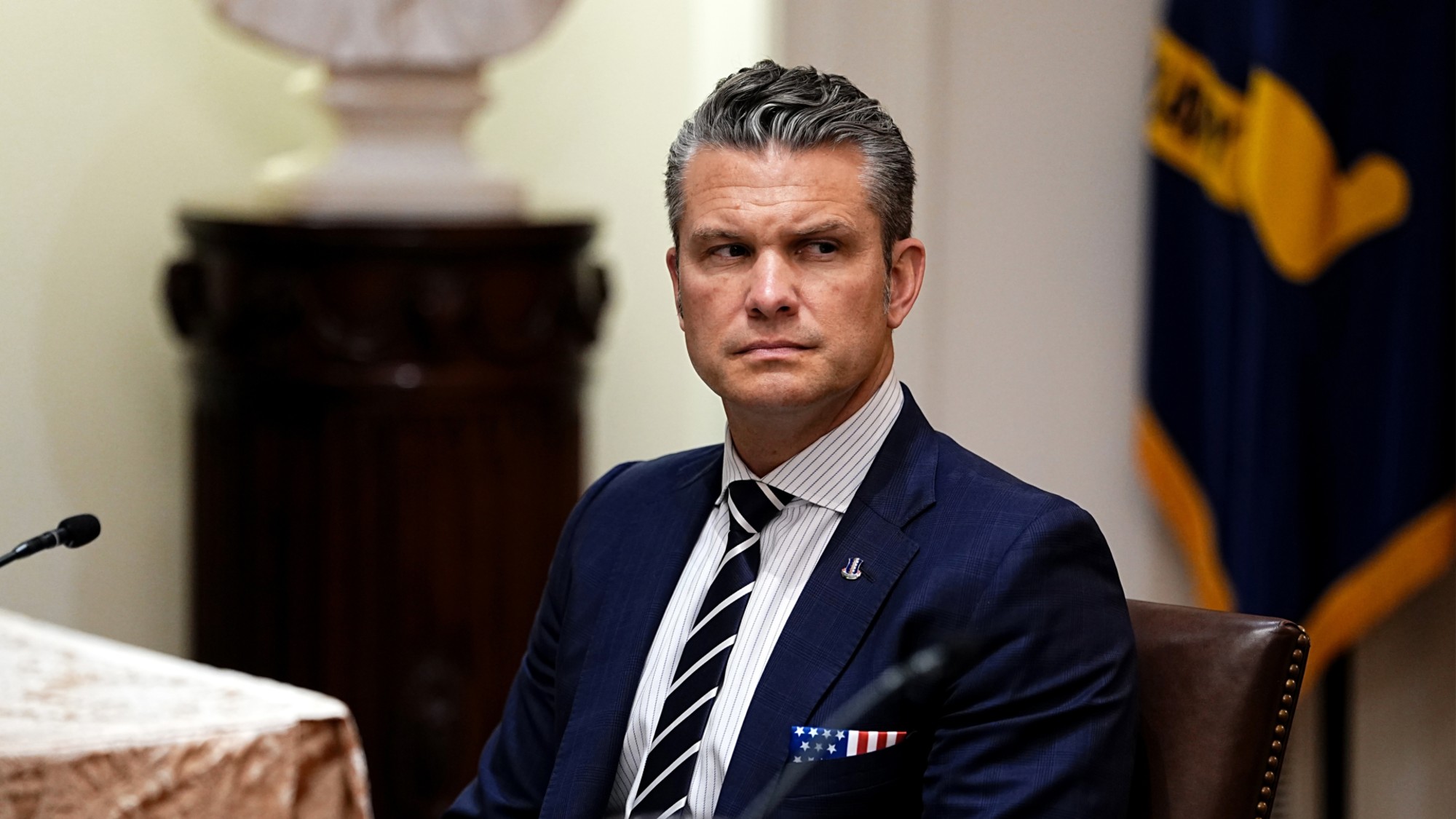Everyone has figured out how susceptible Trump is to flattery — except Trump
The path to the president's favor will remain open to anyone who can stomach taking it


President Trump is struggling at home, which may help explain why he was so excited to hear that a certain special someone was saying nice things about him last week. In a televised address, Russian President Vladimir Putin praised Trump's handling of the American economy and said of the investigation into Russian meddling in the 2016 election, "This is all dreamed up by people who are in the opposition to Trump so as to make sure that everyone thinks that what he's doing and working at is illegitimate."
After some time spent drawing hearts all over his latest copy of Kremlin Beat magazine, Trump decided to pick up the phone and call. Asked later about their conversation, Trump said, "It was great. He said very nice things about what I've done for this country in terms of the economy."
Any other person might have asked, "I wonder if Putin has any ulterior motives for complimenting me?" But not Trump, and this was hardly the first time he had basked in the glow of a compliment from Putin. Through much of the 2016 campaign, when Trump was asked why he was so reluctant to criticize Putin's authoritarian rule, he would respond that he couldn't possibly, because Putin had complimented him. "They want me to disavow Putin," he said at one rally, but he couldn't because "he said Trump is a genius." Or another time: "He called me brilliant. He said very nice things about me." Or another time: "Putin says Trump is brilliant, I love that when he says I'm brilliant."
The Week
Escape your echo chamber. Get the facts behind the news, plus analysis from multiple perspectives.

Sign up for The Week's Free Newsletters
From our morning news briefing to a weekly Good News Newsletter, get the best of The Week delivered directly to your inbox.
From our morning news briefing to a weekly Good News Newsletter, get the best of The Week delivered directly to your inbox.
As it happens, Putin's words were mistranslated; the term he used was closer to "colorful" than "brilliant." But the Russian leader learned a lesson: Give Trump a compliment, and he'll do pretty much whatever you want.
He isn't the only one who has figured out the key to Trump's heart. Lately Sen. Lindsey Graham (R-S.C.)— who in the past said about Trump: "I think he's crazy. I think he's unfit for office" — has been lobbing Twitter love bombs at the president, first complimenting him on his "spectacular golf course," and then responding to the special election in Alabama by saying, "Steve Bannon should have followed President @realDonaldTrump lead in supporting Luther Strange. Trump's instincts on the Alabama race proved to be correct." The widespread assumption is that Graham is abasing himself this way before a president he plainly thinks is an idiot because he's angling to be appointed secretary of state when Rex Tillerson inevitably gets the boot. And there's no better route to the inside track than through Trump's endlessly fragile ego.
Foreign leaders know it too: Pretend that Trump is the demi-god he wishes himself to be, and you'll quickly win his favor. China prepared what they called a "state visit-plus" for him full of red carpets and dramatic greetings, clearly understanding that the way to tamp down his criticism over matters like trade is to pretend you're in awe of him. It may not have had a glowing orb, but Trump seemed duly impressed with how impressed with him they were, or were at least pretending to be.
It's a common phenomenon that powerful people lose sight of their own strengths and weaknesses when everyone around them is constantly telling them how great they are. As one management study put it, "high levels of flattery and opinion conformity can increase CEOs' overconfidence in their strategic judgment and leadership capability, which results in biased strategic decision making," and that "can result in the persistence of low firm performance and may ultimately increase the likelihood of the CEO's dismissal." Which might shed some light on Trump's current situation and prospects for re-election.
A free daily email with the biggest news stories of the day – and the best features from TheWeek.com
But for Trump, the tide of incoming sycophancy was probably always even more intense than for your ordinary CEO, and not just because his financial power was augmented by his celebrity, offering those around him another reason to want to get into his orbit or stay there. The other factor is Trump's character: Even the slightest exposure to him makes clear just how spectacularly insecure he is. People with healthy self-esteem don't go around proclaiming "I'm, like, a smart person" and "I'm really rich" and "Everybody loves me."
What's truly remarkable isn't just that this need hasn't been moderated one bit by his becoming the most powerful person in the world, but also that he seems utterly unaware of how people are manipulating him. Putin in particular seems to need only to throw him a compliment once every couple of years and that's enough to maintain Trump's admiration.
Many presidents in the past have complained about the bubble they're forced to live in, and how it can be a struggle to maintain some sense of perspective. It takes a certain strength of character to overcome your natural human impulses — like our tendency to think highly of anyone who thinks highly of us (and says so). But overcoming impulses isn't really Trump's way. Which means that the path to Trump's favor will remain open to anyone who can stomach taking it.
Paul Waldman is a senior writer with The American Prospect magazine and a blogger for The Washington Post. His writing has appeared in dozens of newspapers, magazines, and web sites, and he is the author or co-author of four books on media and politics.
-
 Looming drone ban has some farm-state Republicans anxious
Looming drone ban has some farm-state Republicans anxiousIN THE SPOTLIGHT As congressional China-hawks work to limit commercial drone sales from Beijing, a growing number of conservative lawmakers are sounding an agricultural alarm
-
 Mind-expanding podcasts you may have missed this fall
Mind-expanding podcasts you may have missed this fallThe Week Recommends True crime, a book club and a therapeutic outlet led this season’s best podcasts
-
 ‘It’s critical that Congress get involved’
‘It’s critical that Congress get involved’Instant Opinion Opinion, comment and editorials of the day
-
 Has Zohran Mamdani shown the Democrats how to win again?
Has Zohran Mamdani shown the Democrats how to win again?Today’s Big Question New York City mayoral election touted as victory for left-wing populists but moderate centrist wins elsewhere present more complex path for Democratic Party
-
 Millions turn out for anti-Trump ‘No Kings’ rallies
Millions turn out for anti-Trump ‘No Kings’ ralliesSpeed Read An estimated 7 million people participated, 2 million more than at the first ‘No Kings’ protest in June
-
 Ghislaine Maxwell: angling for a Trump pardon
Ghislaine Maxwell: angling for a Trump pardonTalking Point Convicted sex trafficker's testimony could shed new light on president's links to Jeffrey Epstein
-
 The last words and final moments of 40 presidents
The last words and final moments of 40 presidentsThe Explainer Some are eloquent quotes worthy of the holders of the highest office in the nation, and others... aren't
-
 The JFK files: the truth at last?
The JFK files: the truth at last?In The Spotlight More than 64,000 previously classified documents relating the 1963 assassination of John F. Kennedy have been released by the Trump administration
-
 'Seriously, not literally': how should the world take Donald Trump?
'Seriously, not literally': how should the world take Donald Trump?Today's big question White House rhetoric and reality look likely to become increasingly blurred
-
 Will Trump's 'madman' strategy pay off?
Will Trump's 'madman' strategy pay off?Today's Big Question Incoming US president likes to seem unpredictable but, this time round, world leaders could be wise to his playbook
-
 Democrats vs. Republicans: who are US billionaires backing?
Democrats vs. Republicans: who are US billionaires backing?The Explainer Younger tech titans join 'boys' club throwing money and support' behind President Trump, while older plutocrats quietly rebuke new administration
